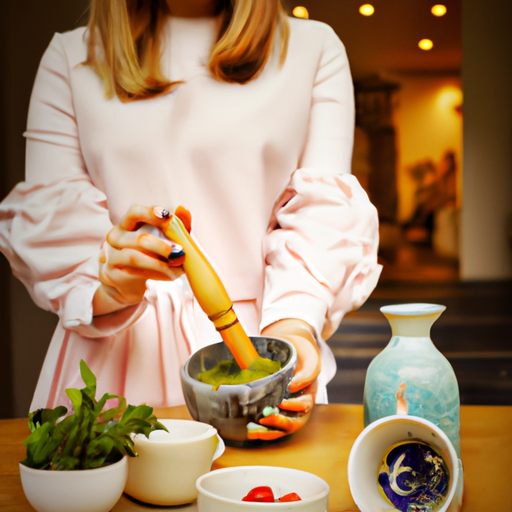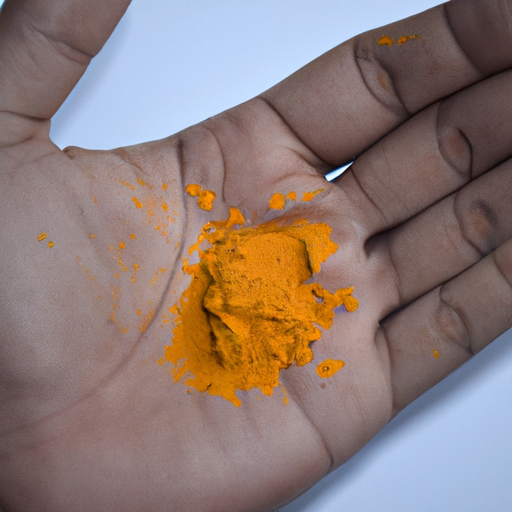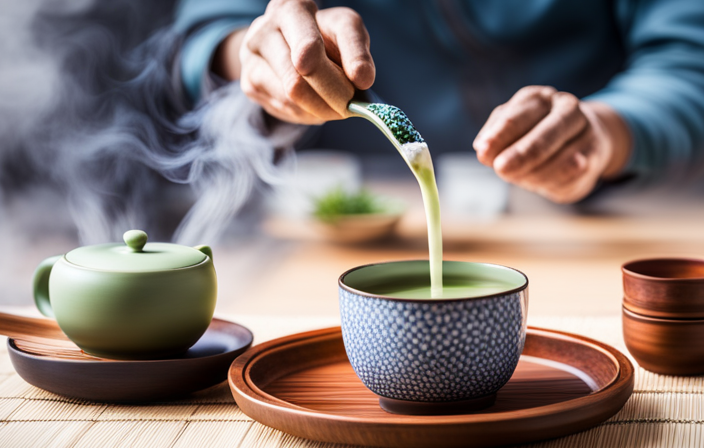Turmeric Tea
Can I Drink Turmeric Tea Before Surgery?

One popular saying suggests that consuming an apple each day can help prevent the need to visit a doctor.
While there may be some truth to that, there are also plenty of other natural remedies and supplements that people turn to for their health needs. One such option is turmeric, a spice commonly used in Indian cuisine that has gained popularity in recent years for its potential health benefits.
However, if you’re scheduled for surgery, you may be wondering if it’s safe to consume turmeric in the form of tea before your procedure. After all, surgery is a serious matter and it’s important to take every precaution to ensure a smooth and successful outcome.
In this article, I’ll explore the potential risks and benefits of drinking turmeric tea before surgery, as well as offer some tips for preparing for your procedure and optimizing your recovery afterwards.
Key Takeaways
- Consuming turmeric in any form prior to surgery can increase the risk of bleeding and interfere with anesthesia effectiveness.
- Alternative natural remedies can be used to reduce inflammation and promote healing without the risks associated with turmeric.
- It’s important to discuss all supplements, including turmeric, with your healthcare provider before surgery to ensure no negative interactions with medications or other treatments.
- Turmeric tea should be avoided before surgery as it can increase the risk of bleeding during and after the procedure.
Understanding Turmeric and Curcumin
Let’s dive into the magical world of turmeric and its powerful compound, curcumin! Turmeric is a spice that’s been used in traditional medicine for centuries. Its bioactive compound, curcumin, has been found to have a range of therapeutic properties. Curcumin is known for its anti-inflammatory, antioxidant, and anti-cancer effects, making it a popular choice for those looking to improve their overall health.
However, it’s important to note that turmeric bioavailability is low, meaning that the body doesn’t absorb curcumin easily. To increase curcumin absorption, it’s often recommended to consume turmeric with black pepper or fat. Black pepper contains piperine, a compound that’s been shown to enhance curcumin absorption by up to 2000%. Additionally, consuming turmeric with fat can improve curcumin absorption, as curcumin is fat-soluble.
Incorporating turmeric into your diet can have many health benefits, but it’s important to consider the best ways to consume it for optimal curcumin absorption. Surgery and inflammation are closely related, and it’s important to understand how turmeric consumption may impact surgical outcomes.
Surgery and Inflammation
You’ll likely face swelling and soreness after surgery, as your body battles the barrage of inflammation. However, there are steps you can take to prepare for surgical healing, and one of them is focusing on pre-operative nutrition. Nutrients like protein, vitamin C, and zinc can all help your body repair itself after surgery, while anti-inflammatory foods like turmeric may help reduce inflammation and pain.
To better understand the relationship between surgery and inflammation, it’s helpful to look at the different phases of healing. The first phase is the inflammatory phase, which typically lasts a few days and is characterized by redness, swelling, and heat at the site of the surgery. The second phase is the proliferative phase, in which the body creates new tissue to repair the damage. Finally, the remodeling phase is when the new tissue is strengthened and reorganized. By focusing on pre-operative nutrition and incorporating anti-inflammatory foods like turmeric, you may be able to reduce the inflammation and pain associated with the first phase of healing.
However, it’s important to consider the risks of drinking turmeric tea before surgery. While turmeric may have anti-inflammatory benefits, it can also increase bleeding risk, which can be dangerous during surgery. In the next section, we’ll explore these risks in more detail.
Risks of Drinking Turmeric Tea Before Surgery
Consuming turmeric in any form prior to a surgical procedure can pose a significant risk due to its potential to increase bleeding. As someone who’s about to undergo surgery, it’s important to understand the possible complications that may arise from drinking turmeric tea before the procedure.
Here are five important things to keep in mind:
- Turmeric can increase the risk of bleeding during and after surgery, which can lead to complications and prolonged recovery time.
- Turmeric can interfere with the effectiveness of anesthesia, which can lead to complications during the surgery.
- There are alternative natural remedies that can be used to reduce inflammation and promote healing without the risks associated with turmeric.
- It’s important to discuss all supplements, including turmeric, with your healthcare provider before surgery to ensure that there are no negative interactions with any medications or other treatments.
- If you’re currently taking turmeric supplements, it’s recommended to stop taking them at least two weeks prior to surgery to reduce the risk of complications.
Despite the potential risks, some people may still wonder about the benefits of drinking turmeric tea before surgery. In the next section, we’ll explore the potential benefits and drawbacks of consuming turmeric before a surgical procedure.
Benefits of Drinking Turmeric Tea Before Surgery
Imagine the potential advantages of having a smoother, less painful recovery after your surgery by utilizing the healing properties of turmeric. Research has shown that consuming turmeric tea before surgery can provide various benefits. Turmeric contains curcumin, a compound known for its anti-inflammatory and antioxidant properties. Drinking turmeric tea before surgery can help reduce inflammation and swelling, which can lead to a faster recovery time.
Moreover, turmeric tea can also help with pain management. According to a study, curcumin can inhibit the production of certain enzymes that cause pain and inflammation. Drinking turmeric tea before surgery can help alleviate pain and discomfort during and after the surgery. However, it is important to note that while there are benefits to drinking turmeric tea before surgery, there are also risks involved.
| Benefits | Risks |
|---|---|
| Reduces inflammation and swelling | May interfere with blood clotting |
| Aids in pain management | May cause gastrointestinal issues |
| Boosts immune system | May interact with medications |
| Promotes healing | May cause allergic reactions |
| Has antioxidant properties |
Before consuming turmeric tea before surgery, it is recommended to consult with your doctor to assess any potential risks and benefits specific to your medical history and current medications.
Consult with Your Doctor
Before incorporating turmeric tea into your pre-surgery routine, it’s important to consult with your doctor.
They can provide valuable insight on whether it’s safe for you to drink turmeric tea before surgery, taking into account any potential interactions with other medications or health conditions.
When speaking with your doctor, be sure to communicate your interest in incorporating turmeric tea and ask for their professional guidance on how to do so in the safest and most effective way possible.
Importance of discussing turmeric tea with your doctor before surgery
It’s crucial to have a conversation with your doctor about turmeric tea’s potential impact on surgery. As I prepare for my upcoming surgery, I have been doing some research on ways to improve my overall health and wellness. I came across information about the benefits of turmeric tea, but I wanted to make sure it was safe to consume before my surgery. After speaking with my doctor, I learned that there are some potential risks associated with consuming turmeric tea before surgery.
To help understand the potential impact, my doctor provided me with a table that outlined the possible risks and precautions associated with consuming turmeric tea before surgery. This table was incredibly helpful in guiding our conversation and allowed me to make an informed decision about whether or not to include turmeric tea in my pre-surgical routine. It’s important to discuss any supplements or changes in diet with your doctor before surgery to ensure the best possible outcome.
When talking to your doctor about incorporating turmeric into your pre-surgery routine, it’s important to approach the conversation with an open mind and a willingness to listen to their recommendations. By having an honest and open discussion, you can work together to determine the best course of action for your specific situation. It’s important to remember that every individual is different, and what works for one person may not work for another. Ultimately, the goal is to work together with your doctor to ensure a safe and successful surgery.
How to talk to your doctor about incorporating turmeric into your pre-surgery routine
Before undergoing any surgical procedure, it’s essential to discuss any dietary changes with your physician. This includes incorporating turmeric tea into your pre-surgery routine.
As discussed in the previous subtopic, turmeric has numerous health benefits, but it may also cause complications during surgery. Therefore, it’s crucial to have an open and honest conversation with your doctor about the use of turmeric tea before your surgery.
To help guide the conversation with your physician, here are some talking points to consider:
-
Explain why you’re interested in incorporating turmeric tea into your pre-surgery routine.
-
Share information about the turmeric tea brand you plan to use.
-
Discuss any previous experiences you’ve had with turmeric tea.
-
Ask your doctor if they have any concerns about incorporating turmeric tea before surgery.
-
Seek advice from your doctor about the appropriate dosage and timing of turmeric tea consumption.
By discussing these points with your physician, you can ensure that you’re making an informed decision about incorporating turmeric tea into your pre-surgery routine. It’s essential to take your doctor’s concerns into consideration and follow their recommendations to prepare for surgery properly.
Preparing for Surgery
As I prepare for my upcoming surgery, there are a few key points I need to keep in mind. First, I should follow any pre-surgical instructions given to me by my doctor to ensure a successful procedure.
Additionally, it’s important to avoid certain foods and supplements before surgery to minimize the risk of complications. By taking these steps seriously, I can help ensure that my surgery goes smoothly and with minimal complications.
Tips for preparing for surgery
Get your body and mind ready for the big day by implementing calming techniques such as deep breathing exercises and meditation. These are great ways to reduce anxiety and promote relaxation, which can help you feel more comfortable and confident before surgery.
In addition to these relaxation techniques, there are several other things you can do to prepare yourself for surgery:
-
Stay hydrated: Drinking plenty of water can help keep your body hydrated, which is important for maintaining proper bodily functions and promoting healing.
-
Eat nutritious foods: Eating a balanced diet filled with nutrient-rich foods can help boost your immune system and promote healing after surgery.
-
Get plenty of rest: Sleep is crucial for your body to repair and recover, so make sure you get enough rest in the days leading up to your surgery.
-
Stay positive: A positive attitude can go a long way in helping you feel more comfortable and confident before surgery. Try to focus on the positive aspects of the surgery, such as the fact that it will improve your health and quality of life.
It’s important to note that certain nutritional supplements and relaxation techniques may need to be avoided before surgery. In the next section, we’ll discuss which foods and supplements you should avoid prior to surgery.
Avoiding certain foods and supplements before surgery
To ensure a smooth surgery, it’s important for me to steer clear of certain foods and supplements that may interfere with the procedure. In particular, I need to pay attention to pre-surgery fasting and dietary restrictions. My doctor has advised me to avoid eating or drinking anything for at least 8 hours before the surgery. This is because food and liquids in my stomach can increase my risk of aspiration, which is when stomach contents are inhaled into the lungs.
In addition to fasting, I also need to avoid certain foods and supplements that can impact my blood clotting, blood pressure, or immune system. My doctor has provided me with a list of dietary restrictions, which includes foods high in vitamin E, garlic, ginger, and turmeric. In fact, I should not drink turmeric tea before surgery as it can increase my risk of bleeding during and after the procedure. By following these instructions, I can help minimize the risks and complications associated with surgery.
It is important for me to follow these pre-surgical instructions from my doctor to ensure that I am in the best possible condition for the surgery. Failing to comply with these instructions can lead to complications during and after the procedure, which can prolong my recovery time and even jeopardize my health. Therefore, I need to take these dietary restrictions seriously and make sure to adhere to them strictly.
The importance of following pre-surgical instructions from your doctor
While it’s important to avoid certain foods and supplements before surgery, it’s equally important to follow all pre-surgical instructions given by your doctor. This includes any necessary lifestyle changes and pre-surgical testing. These instructions are designed to minimize the risk of complications and ensure a successful surgery.
One of the most important aspects of pre-surgical testing is determining whether or not you are at risk for complications related to anesthesia. This testing may involve blood work, EKGs, and other diagnostic tests. Your doctor may also recommend lifestyle changes such as quitting smoking, losing weight, or increasing your physical activity to improve your overall health before the surgery.
By following these instructions, you can help ensure a safe and successful surgery. Moving forward, if you’re interested in incorporating turmeric into your diet before surgery, there are alternative ways to do so.
Alternative Ways to Incorporate Turmeric into Your Diet
You might consider incorporating turmeric into your diet through alternative methods, such as adding it to your morning smoothie or sprinkling it over roasted vegetables, to reap its potential health benefits.
Turmeric is a spice that has been used for centuries in traditional medicine to treat a variety of ailments. It contains a compound called curcumin, which has anti-inflammatory and antioxidant properties that may reduce the risk of chronic diseases such as heart disease, cancer, and Alzheimer’s.
Turmeric recipes are abundant online and in cookbooks, and can be easily incorporated into your daily meals. For example, you can make a turmeric latte, turmeric rice, or turmeric chicken. Adding black pepper to your turmeric recipes can also enhance the absorption of curcumin in your body.
By incorporating turmeric into your diet, you may be able to improve your overall health and well-being, but always consult with your doctor before adding any substances to your diet, especially prior to surgery.
Incorporating turmeric into your diet is just one way to take control of your health. However, it is important to also follow your doctor’s pre-surgical instructions to ensure a safe and successful operation.
After surgery, the focus shifts to post-surgery recovery, which can also benefit from a healthy and balanced diet.
Post-Surgery Recovery
Before my surgery, I was considering drinking turmeric tea to potentially reduce inflammation and improve my overall health. However, I learned that there may be some risks associated with consuming turmeric before surgery, such as increased bleeding.
On the other hand, there are also potential benefits, such as reducing pain and inflammation after surgery. Based on my research and conversations with my doctor, I’ve decided to hold off on drinking turmeric tea before my surgery and instead focus on incorporating it into my post-surgery recovery routine.
Recap of the potential risks and benefits of drinking turmeric tea before surgery
Recapping the potential risks and benefits of drinking turmeric tea before surgery can provide you with a better understanding of how it may affect you. While turmeric is known to have numerous health benefits, including anti-inflammatory and antioxidant properties, it also poses some risks when consumed before surgery.
One of the main concerns is that turmeric can thin the blood and increase the risk of bleeding during and after surgery. This can be particularly concerning if you are undergoing a procedure that involves cutting or incisions.
It’s important to consult with your doctor before incorporating turmeric tea into your pre-surgery routine. Your doctor can assess your individual situation and provide recommendations based on your medical history and the specific procedure you are undergoing. They may advise you to stop drinking turmeric tea a certain number of days before surgery to ensure that it does not interfere with your body’s ability to clot blood.
With the guidance of your doctor, you can make an informed decision about whether or not to drink turmeric tea before surgery. As you prepare for your surgery, it is essential to follow your doctor’s recommendations and to prioritize your health and safety.
Incorporating turmeric tea into your pre-surgery routine may offer some potential benefits, but it is important to weigh these against the potential risks. By working closely with your doctor and staying informed about the potential effects of turmeric on your body, you can make the best decisions for your health and well-being.
Final recommendations for incorporating turmeric into your pre-surgery routine
As you prepare for your upcoming surgery, it’s beneficial to incorporate herbal alternatives like turmeric into your preoperative nutrition. However, it’s crucial to consult with your doctor before doing so, as turmeric can interact with certain medications and cause complications during surgery. Your doctor can advise you on the appropriate dosage and timing of turmeric intake to ensure your safety and well-being.
It’s important to keep in mind that turmeric should not be relied upon as the sole method for preparing for surgery. Maintaining a balanced diet, staying hydrated, and following your doctor’s preoperative instructions are all essential for a successful surgical outcome.
By working closely with your healthcare team, you can ensure that your preoperative nutrition plan is tailored to your specific needs and goals. As you move forward with your pre-surgery routine, it may be helpful to explore additional resources on the benefits and potential risks of incorporating turmeric into your diet. These resources can provide valuable insights and guidance on creating a holistic and effective preoperative nutrition plan.
Additional Resources
Check out some helpful resources for more information on the benefits and risks of drinking turmeric tea before your surgery, so you can make an informed decision for yourself. Here are three resources I found particularly helpful when researching this topic:
-
The American Society of Anesthesiologists (ASA) offers a helpful guide to proper pre-surgery nutrition, including what foods and supplements to avoid before your procedure. It also includes information on the effects of turmeric on the body and how it may interact with anesthesia.
-
The National Center for Complementary and Integrative Health (NCCIH) also has a great article on turmeric and its potential health benefits, as well as any possible risks or side effects. This resource is particularly useful for anyone interested in incorporating turmeric into their daily routine for general health and wellness.
-
Finally, the Mayo Clinic provides a comprehensive overview of turmeric supplements and their potential benefits and risks. It also includes information on dosages and how to avoid any potential interactions with medications or medical conditions.
Remember, it’s always important to consult with your healthcare provider before making any changes to your diet or supplement routine, especially if you’re preparing for surgery. With these resources, you’ll be able to make a more informed decision about whether or not to drink turmeric tea before your procedure.
Frequently Asked Questions
What are the side effects of drinking turmeric tea before surgery?
I experienced nausea and dizziness after drinking turmeric tea before surgery. It’s important to know that turmeric tea can also affect pregnancy. Consult with your doctor before consuming it.
Can turmeric tea interact with anesthesia or other medications during surgery?
It’s important to inform your doctor of any herbal supplements or teas you consume before surgery. Turmeric tea may have anesthesia interaction or medication contraindications, so it’s best to consult with your physician.
How long before surgery should I stop drinking turmeric tea?
To ensure optimal hydration before surgery, it’s important to consume plenty of water. Although turmeric tea benefits are significant, it’s best to avoid it for at least 24 hours prior to surgery to prevent any potential interactions with anesthesia or other medications.
Is it safe to drink turmeric tea if I have a history of bleeding disorders or take blood thinners?
As someone with a history of bleeding disorders or taking blood thinners, it may not be safe to consume turmeric tea without consulting with a healthcare professional first. Its potential effects on blood clotting should be carefully considered.
Can drinking turmeric tea before surgery affect the results of my surgery or recovery time?
Pre-surgery nutrition is important for optimal recovery. However, it’s crucial to consult with your healthcare provider before incorporating any alternative remedies, such as turmeric tea, as they may affect surgery outcomes.
Conclusion
In conclusion, drinking turmeric tea before surgery may have potential benefits in reducing inflammation and aiding in post-surgery recovery. However, there are also risks associated with consuming turmeric before surgery, such as the possibility of increased bleeding. It’s important to consult with your doctor and follow their instructions regarding diet and supplements leading up to surgery.
Turmeric can be seen as a double-edged sword, with its potential benefits and risks. Like a powerful tool, it must be used with caution and precision. Therefore, it’s crucial to approach the consumption of turmeric and other supplements with a level of mindfulness and responsibility.
Ultimately, the decision to drink turmeric tea before surgery should be made in consultation with a medical professional, taking into account individual circumstances and needs.
Turmeric Tea
Can You Drink Chamomile Tea On Low Fodmap Diet

As I sit here, enjoying a cozy cup of chamomile tea, the soothing scent fills the room, calming my senses and easing my mind. Chamomile tea is known for its gentle and comforting qualities, making it a go-to option for those looking for peace and relaxation.
But for those following a low FODMAP diet, a question arises: can you enjoy the benefits of chamomile tea without disrupting your digestive system?
The low FODMAP diet is designed to alleviate symptoms of irritable bowel syndrome (IBS) by reducing intake of certain carbohydrates that can trigger digestive distress. FODMAPs, short for fermentable oligosaccharides, disaccharides, monosaccharides, and polyols, are found in a variety of foods and beverages, including some herbal teas.
But fear not, fellow tea lovers, for chamomile tea is a delightful exception.
In this article, we will delve into the world of chamomile tea and its compatibility with a low FODMAP diet. We will explore the potential benefits of chamomile tea, its impact on the digestive system, and provide you with recipes and ideas for incorporating this soothing brew into your low FODMAP lifestyle.
So sit back, relax, and let’s unravel the wonders of chamomile tea on a low FODMAP diet.
Key Takeaways
- Chamomile tea is low in FODMAPs and can be enjoyed on a low FODMAP diet.
- Chamomile tea has anti-inflammatory properties that can soothe the digestive system and alleviate symptoms such as stomach cramps and indigestion.
- Chamomile tea has a calming effect on the body, which can be beneficial for individuals with IBS who may experience stress-related symptoms.
- It’s important to check the ingredients of herbal teas before consuming them, as some may contain high FODMAP ingredients that can trigger symptoms.
Understanding the Low FODMAP Diet
If you’re on a low FODMAP diet, you can drink chamomile tea. The low FODMAP diet aims to improve digestive health for individuals with irritable bowel syndrome (IBS). FODMAPs are carbohydrates that can trigger symptoms like bloating, gas, and abdominal pain. Chamomile tea is considered low in FODMAPs and can be enjoyed on this diet.
Chamomile tea has been used for centuries as a natural remedy for various health conditions, including digestive issues. It has anti-inflammatory properties that can soothe the digestive system and alleviate symptoms such as stomach cramps and indigestion. Additionally, chamomile tea has a calming effect on the body, which can be beneficial for individuals with IBS who may experience stress-related symptoms.
While chamomile tea can provide relief for some digestive symptoms, it may not work for everyone. It’s always best to consult with a healthcare professional or registered dietitian before making any major changes to your diet, especially if you have specific dietary restrictions or medical conditions.
Exploring the Benefits of Chamomile Tea
Sipping on a warm cup of chamomile can bring a sense of calm and relaxation to your day. Not only is chamomile tea known for its soothing properties, but it can also be a great option for those following a low FODMAP diet.
FODMAPs, which stands for Fermentable Oligosaccharides, Disaccharides, Monosaccharides, and Polyols, are types of carbohydrates that can cause digestive discomfort in some individuals.
Chamomile tea is considered low in FODMAPs, making it a safe choice for those with sensitive stomachs. It contains compounds that have been shown to have anti-inflammatory and anti-spasmodic effects, which can help alleviate symptoms such as bloating and cramping.
If you’re looking for low FODMAP chamomile tea recipes, there are plenty of options available. You can simply steep chamomile flowers in hot water for a few minutes, or you can experiment with adding other low FODMAP ingredients like ginger or lemon for added flavor.
In addition to its digestive benefits, chamomile tea is also well-known for its relaxation properties. It can help promote sleep, reduce anxiety, and improve overall mood. So, if you’re looking to unwind after a long day, a cup of chamomile tea might just be what you need.
Transitioning to the next section about ‘chamomile tea and FODMAPs’, it’s important to understand how the tea can affect individuals with FODMAP sensitivities.
Chamomile Tea and FODMAPs
Indulging in a warm cup of chamomile tea can transport you to a tranquil oasis, but for individuals with FODMAP sensitivities, it’s essential to understand how this soothing beverage can impact their digestive comfort.
Chamomile tea has been enjoyed for centuries and is derived from the flowers of the chamomile plant, which is native to Europe and Asia. There are two main types of chamomile tea available: German chamomile and Roman chamomile. German chamomile is known for its potent anti-inflammatory properties, while Roman chamomile is often used for its calming effects on the nervous system.
For those following a low FODMAP diet, it’s important to note that chamomile tea is considered low FODMAP and can be consumed without triggering symptoms. This is good news for individuals looking for a soothing and calming drink that won’t upset their digestive system. However, it’s always a good idea to consult with a healthcare professional or registered dietitian before making any significant dietary changes.
Understanding the origins and different types of chamomile tea can help individuals with FODMAP sensitivities make informed choices about what they consume.
In the next section, we will explore the effects of chamomile tea on the digestive system and how it can promote overall digestive comfort.
The Effects of Chamomile Tea on the Digestive System
Consuming chamomile tea can have positive effects on the digestive system, promoting overall comfort and well-being. Here are three key reasons why chamomile tea is beneficial for your digestive health:
-
Improved Sleep: Chamomile tea has been used for centuries as a natural remedy for insomnia and sleep disorders. Its calming properties help relax the mind and body, making it easier to fall asleep and stay asleep throughout the night. By promoting a good night’s sleep, chamomile tea indirectly supports digestive health, as sleep deprivation can negatively impact the digestive system.
-
Anxiety Relief: Chamomile tea has been shown to reduce anxiety symptoms. Anxiety can have a direct impact on the digestive system, causing symptoms such as stomachaches, bloating, and diarrhea. By calming the mind and reducing anxiety, chamomile tea can help alleviate these digestive issues.
-
Anti-inflammatory Properties: Chamomile tea contains compounds that have anti-inflammatory effects. Inflammation in the digestive system can lead to various digestive disorders, including irritable bowel syndrome (IBS) and inflammatory bowel disease (IBD). By reducing inflammation, chamomile tea can help soothe the digestive system and improve overall gut health.
Transition: Now that we understand the beneficial effects of chamomile tea on the digestive system, let’s explore some recipes and ideas for enjoying this soothing beverage.
Recipes and Ideas for Enjoying Chamomile Tea
If you’re in need of a little relaxation and flavor, try these delightful recipes for enjoying the soothing benefits of chamomile tea. Chamomile tea not only tastes great, but it also offers numerous health benefits. From improving sleep to reducing inflammation, chamomile tea is a wonderful addition to a low FODMAP diet. Here are some recipes and ideas to help you enjoy chamomile tea to the fullest:
| Recipe | Ingredients | Instructions |
|---|---|---|
| Chamomile Honey Lemonade | – 2 cups of brewed chamomile tea – 1 tablespoon of honey – Juice of 1 lemon |
1. Brew chamomile tea and let it cool. 2. In a pitcher, mix the brewed tea, honey, and lemon juice. 3. Refrigerate for at least 1 hour before serving. |
| Chamomile Latte | – 1 cup of brewed chamomile tea – 1/2 cup of milk (lactose-free or almond milk for low FODMAP) – 1 teaspoon of maple syrup |
1. Brew chamomile tea and let it cool. 2. In a saucepan, heat the milk and maple syrup until warm. 3. Froth the milk using a milk frother or by whisking vigorously. 4. Pour the brewed tea into a mug and top with frothed milk. |
| Chamomile Infused Water | – 1 chamomile tea bag – 1 liter of water – Slices of cucumber or lemon (optional) |
1. Place the chamomile tea bag in a pitcher. 2. Pour the water into the pitcher. 3. Add slices of cucumber or lemon for extra flavor. 4. Refrigerate for at least 1 hour before serving. |
These recipes provide a variety of ways to enjoy the calming effects of chamomile tea while following a low FODMAP diet. They are easy to make and can be customized to suit your taste preferences. Drinking chamomile tea regularly can be a great addition to your low FODMAP lifestyle, helping to promote relaxation and digestive health. Transitioning to the next section, let’s explore some tips for maintaining a successful low FODMAP lifestyle.
Tips for a Successful Low FODMAP Lifestyle
When it comes to successfully following a low FODMAP lifestyle, there are a few key points to keep in mind.
First, meal planning and preparation are crucial in order to ensure you have suitable options on hand and don’t get caught off guard.
Second, finding suitable alternatives for high FODMAP foods can be a challenge, but with a little research and creativity, it’s possible to enjoy a wide variety of delicious meals.
Lastly, seeking support from a healthcare professional or dietitian can provide valuable guidance and help navigate any questions or concerns that may arise along the way.
Meal planning and preparation
Looking to spice up your low FODMAP meal plan? Try incorporating chamomile tea into your daily routine for a soothing and delicious addition. Not only does chamomile tea provide a comforting and calming effect on the digestive system, but it also offers a range of health benefits.
Here are four reasons why chamomile tea is a great choice for those on a low FODMAP diet:
- It has anti-inflammatory properties that can help soothe an irritated digestive system.
- Chamomile tea is known for its ability to relieve bloating and indigestion, common symptoms of digestive disorders.
- It can help promote better sleep, which is essential for overall digestive health.
- Chamomile tea is caffeine-free, making it a suitable option for those with sensitive digestive systems.
With chamomile tea as a tasty and beneficial addition to your low FODMAP meal plan, you can continue to prioritize your digestive health.
Now, let’s explore finding suitable alternatives for high FODMAP foods.
Finding suitable alternatives for high FODMAP foods
When it comes to following a low FODMAP diet, meal planning and preparation are essential. However, it can be challenging to find suitable alternatives for high FODMAP foods. Luckily, there are plenty of options available that can provide both nutritional value and digestive benefits.
For example, if you’re looking for a warm beverage to replace high FODMAP options like coffee or black tea, chamomile tea is a great choice. Not only is chamomile tea low FODMAP, but it also has soothing properties that can help with digestion. It’s important to note that not all herbal teas are low FODMAP, so it’s crucial to check the ingredients before consuming.
By finding suitable alternatives for high FODMAP foods, you can still enjoy a wide variety of delicious and gut-friendly options. Transitioning into the next section, seeking support from a healthcare professional or dietitian can further enhance your low FODMAP journey.
Seeking support from a healthcare professional or dietitian
Seeking support from a healthcare professional or dietitian is like having a compass on your low FODMAP journey, guiding you towards a gut-friendly path.
These experts can provide valuable guidance and expertise when it comes to meal planning and finding suitable alternatives for high FODMAP foods. They can help you navigate the complexities of the diet, ensuring that you’re getting all the necessary nutrients while avoiding trigger foods. They can also provide personalized advice based on your specific needs and preferences.
A healthcare professional or dietitian can help you create a well-balanced and enjoyable low FODMAP meal plan that fits your lifestyle. With their support, you can confidently make informed choices and make the most out of your low FODMAP journey.
Listening to your body’s response is crucial in finding which foods work best for you, which I’ll discuss in the next section.
Listening to Your Body’s Response
Pay attention to how your body reacts after drinking chamomile tea on a low FODMAP diet, so you can truly understand its impact on your well-being.
When it comes to exploring intuitive eating and understanding food sensitivities, listening to your body is crucial. Each person’s body is unique, and what works for one may not work for another.
While chamomile tea is generally considered low FODMAP and safe to consume, it’s important to pay attention to any potential symptoms or discomfort that may arise after drinking it.
Some individuals may experience bloating, gas, or digestive issues after consuming chamomile tea, even though it is low in FODMAPs. This could be due to individual sensitivities or other factors. It’s recommended to start with a small amount and gradually increase the intake to see how your body responds. Keeping a food diary can also help identify any potential triggers or patterns.
Incorporating chamomile tea into your low FODMAP diet can have various benefits, such as promoting relaxation and aiding digestion. However, it’s essential to listen to your body and make adjustments based on its response. If you notice any adverse effects, it may be necessary to limit or avoid chamomile tea altogether.
Understanding how your body reacts to chamomile tea on a low FODMAP diet is an important aspect of managing your overall well-being. By paying attention to your body’s signals and making informed decisions, you can find the right balance for your individual needs.
Moving forward, let’s explore potential challenges and solutions in incorporating chamomile tea into a low FODMAP diet.
Potential Challenges and Solutions
When following a low FODMAP diet, it’s important to consider if other herbal teas can be consumed. Some herbal teas, like peppermint and ginger, may contain high FODMAPs and should be avoided.
As for chamomile tea, while it’s generally considered safe to drink on a low FODMAP diet, it’s important to be aware that some individuals may have a sensitivity to chamomile. Additionally, chamomile tea may interact with certain medications, so it’s always best to consult with a healthcare professional before incorporating it into your diet.
Can I drink other herbal teas on a low FODMAP diet?
You can definitely enjoy other herbal teas on a low FODMAP diet, like peppermint or ginger, which can soothe your stomach like a warm hug. These teas are low in FODMAPs and can be a great alternative to chamomile tea if you want to mix things up.
Peppermint tea has been known to help with digestion and relieve symptoms of irritable bowel syndrome (IBS), while ginger tea has anti-inflammatory properties that can aid in reducing bloating and nausea. It’s important to note that not all herbal teas are low FODMAP, so it’s best to check the ingredients before consuming.
Now, let’s explore if there are any contraindications for chamomile tea on a low FODMAP diet.
Are there any contraindications for chamomile tea?
There aren’t any specific issues with chamomile tea on a low FODMAP diet, but it’s always important to check the ingredients just in case. Chamomile tea is generally considered safe for consumption, even during pregnancy. However, pregnant women should consult their healthcare provider before consuming chamomile tea or any herbal tea.
While rare, some individuals may experience allergic reactions to chamomile tea, such as skin rashes or difficulty breathing. If you have a known allergy to plants in the daisy family, such as ragweed or marigolds, it’s best to avoid chamomile tea.
It’s important to note that chamomile tea can potentially interact with certain medications, such as blood thinners or sedatives, so it’s always a good idea to talk to your healthcare provider if you’re taking any medications.
Moving on to the next section, let’s explore whether chamomile tea can interact with medications.
Can chamomile tea interact with medications?
Chamomile tea may have potential interactions with certain medications, so it’s important to consult with your healthcare provider if you’re taking any medications. While chamomile tea is generally considered safe for most people, it can still have some potential side effects and interact with certain drugs.
According to research, chamomile tea may interact with blood thinners such as warfarin, increasing the risk of bleeding. It may also interact with sedatives and antidepressants, intensifying their effects and leading to excessive drowsiness or dizziness. Additionally, chamomile tea may interfere with the absorption of certain drugs, reducing their effectiveness.
To help you understand potential interactions better, here is a table summarizing some medications that may interact with chamomile tea:
| Medication Category | Potential Interaction |
|---|---|
| Blood Thinners | Increased bleeding risk |
| Sedatives | Enhanced drowsiness |
| Antidepressants | Increased sedation |
| Absorption inhibitors | Reduced effectiveness |
Remember, it’s always best to discuss any potential interactions or side effects with your healthcare provider before incorporating chamomile tea into your routine.
Frequently Asked Questions
Can chamomile tea help with digestion issues like bloating and gas?
Chamomile tea can be beneficial for digestion issues like bloating and gas. It has natural properties that can soothe the digestive system and reduce inflammation.
Additionally, chamomile tea is known for its stress-relieving effects, helping to calm the mind and body. It can also serve as a sleep aid, promoting relaxation and improving sleep quality.
However, if you’re following a low FODMAP diet, it’s important to check if chamomile tea is allowed within your specific dietary restrictions.
Are there any side effects of drinking chamomile tea?
Chamomile tea is generally safe to consume and offers numerous health benefits. However, it’s important to be aware of potential allergic reactions, especially if you have a known allergy to plants in the daisy family.
Additionally, chamomile tea is often praised for its relaxing properties, but it may also impact sleep quality for some individuals.
As always, it’s best to consult with a healthcare professional if you have any concerns or specific health conditions.
Can chamomile tea be consumed by pregnant women on a low FODMAP diet?
Chamomile tea can be consumed by pregnant women, including those on a low FODMAP diet. It’s considered safe and may even help with morning sickness. However, it’s important to consume chamomile tea in moderation. During the third trimester, chamomile tea should be consumed with caution as it may stimulate contractions. As always, it’s advisable to consult with a healthcare professional before making any dietary changes during pregnancy.
Can chamomile tea interfere with medication or other dietary restrictions?
Chamomile tea, a popular herbal remedy, can potentially interact with certain medications or dietary restrictions. It’s important to consult with a healthcare professional or pharmacist before consuming chamomile tea, especially if you’re taking medications such as blood thinners or sedatives.
Additionally, pregnant women on a low FODMAP diet should exercise caution and discuss with their healthcare provider about the safety and recommended dosage of chamomile tea.
Is there a recommended dosage or frequency for drinking chamomile tea on a low FODMAP diet?
When following a low FODMAP diet, it’s important to consider the recommended frequency of drinking chamomile tea. While chamomile tea is generally well-tolerated, excessive consumption may have negative effects on gut health. It’s advisable to limit intake to a moderate amount, such as 1-2 cups per day. As with any dietary changes, it’s always best to consult with a healthcare professional or registered dietitian for personalized recommendations.
Conclusion
In conclusion, chamomile tea can be enjoyed as part of a low FODMAP diet. Its soothing properties have been found to benefit the digestive system, making it a popular choice for those with digestive issues. It’s important to listen to your body’s response and make adjustments as needed.
Interestingly, a study published in the Journal of Agricultural and Food Chemistry found that chamomile tea contains certain compounds that have anti-inflammatory effects, which can help alleviate digestive discomfort. So go ahead and sip on a cup of chamomile tea, knowing that it can be a delicious and beneficial addition to your low FODMAP lifestyle.
Turmeric Tea
Does Cardamom Break Intermittent Fasting

While enjoying my morning coffee, the scent of freshly ground cardamom fills the air, taking me on a journey to a realm of unique flavors and ancient customs. However, as I indulge in my admiration for this spice, a question lingers in my mind focused on fasting: does cardamom disrupt intermittent fasting?
Intermittent fasting has gained popularity for its potential health benefits, including weight loss, improved insulin sensitivity, and reduced inflammation. It involves alternating periods of eating and fasting, with various approaches to timing and duration. But when it comes to incorporating cardamom into your fasting routine, the answer may not be so clear-cut.
In this article, we will delve into the role of cardamom in intermittent fasting, exploring its potential effects on insulin levels, autophagy, and metabolism. We will also discuss how to incorporate cardamom into your fasting routine and explore other spices and foods to consider during fasting.
So, grab a cup of cardamom-infused tea, and let’s uncover the truth behind this flavorful spice and its impact on intermittent fasting.
Key Takeaways
- Cardamom can be incorporated into intermittent fasting and does not break the fast.
- Cardamom may have effects on insulin levels, autophagy, and metabolism during intermittent fasting.
- Cardamom adds flavor to meals and can make them more satisfying and enjoyable during fasting periods.
- Mindful eating and avoiding common mistakes, such as using cardamom in large quantities or adding it to sweetened beverages or desserts, can optimize the benefits of intermittent fasting.
Understanding Intermittent Fasting
So, you’re curious about intermittent fasting and whether or not cardamom can disrupt it, huh? Well, let’s start by understanding what intermittent fasting is all about.
Intermittent fasting is an eating pattern that cycles between periods of fasting and eating. There are several different schedules, but the most common ones include the 16/8 method, where you fast for 16 hours and have an 8-hour eating window, and the 5:2 method, where you eat normally for 5 days and restrict your calorie intake for 2 days.
Intermittent fasting has gained popularity due to its potential health benefits. Research suggests that it may help with weight loss, improve insulin sensitivity, reduce inflammation, and even promote longevity. However, it’s important to note that the benefits of intermittent fasting can vary from person to person, and more research is needed to fully understand its effects on different individuals.
Now, let’s explore the health benefits of intermittent fasting in more detail.
Exploring the Health Benefits of Intermittent Fasting
One of the health benefits of intermittent fasting is that it can aid in weight loss, as demonstrated by a study where participants lost an average of 10 pounds over a 12-week period. Intermittent fasting has been shown to have several positive effects on the body, including improved brain health.
Here are four ways in which intermittent fasting can benefit your overall health:
-
Reduced calorie intake: By limiting the time window in which you can eat, intermittent fasting naturally reduces your calorie intake, which can contribute to weight loss.
-
Increased fat burning: During fasting periods, your body switches to burning stored fat for energy, leading to a reduction in body fat.
-
Improved insulin sensitivity: Intermittent fasting has been shown to improve insulin sensitivity, which is crucial for maintaining stable blood sugar levels and preventing diseases like diabetes.
-
Enhanced brain function: Studies have suggested that intermittent fasting can improve brain health by promoting the growth of new nerve cells and protecting against neurodegenerative diseases.
Considering the potential benefits of intermittent fasting on weight loss and brain health, it’s important to explore how cardamom, a popular spice, may play a role in this fasting practice.
The Role of Cardamom in Intermittent Fasting
To enhance your intermittent fasting practice, consider incorporating cardamom, a popular spice, into your routine. Cardamom has been used for centuries in traditional medicine and culinary practices, and it’s worth exploring its potential benefits.
One of the main roles of spices in intermittent fasting is to enhance the flavor of meals, making them more satisfying and enjoyable. Cardamom, in particular, adds a unique and aromatic taste to dishes, making it a great addition to your fasting routine.
In addition to its flavor-enhancing properties, cardamom also offers several health benefits. Research suggests that cardamom may have antioxidant and anti-inflammatory effects, which can help protect against chronic diseases. It may also have antimicrobial properties and could potentially support digestive health. Furthermore, cardamom has been shown to help regulate blood sugar levels, which is particularly important during fasting periods.
Incorporating cardamom into your intermittent fasting routine is easy. You can add it to your morning coffee or tea, sprinkle it on your oatmeal or yogurt, or use it as a seasoning for your meals. By doing so, you can enjoy the potential health benefits of cardamom while following your fasting schedule.
Transitioning into the subsequent section, let’s explore different ways to incorporate cardamom into your intermittent fasting routine.
How to Incorporate Cardamom into your Intermittent Fasting Routine
Incorporating cardamom into your intermittent fasting routine can be easily achieved by adding it to your morning beverage or using it as a seasoning for your meals. Cardamom not only adds a unique flavor to your dishes but also offers several health benefits that can aid in weight loss.
Here are some cardamom recipes and the benefits of cardamom in weight loss:
-
Cardamom-infused tea: Brew a cup of green tea and add a pinch of ground cardamom for a flavorful twist. Green tea is known for its metabolism-boosting properties, and cardamom adds a refreshing and aromatic touch.
-
Cardamom-spiced oats: Sprinkle some ground cardamom on your morning bowl of oats. Cardamom’s natural sweetness complements the nuttiness of oats, making it a delicious and filling breakfast option.
-
Cardamom smoothie: Blend together a banana, almond milk, a handful of spinach, and a dash of ground cardamom for a nutritious and flavorful smoothie. This combination provides a good balance of carbohydrates, protein, and healthy fats.
-
Cardamom roasted vegetables: Toss your favorite vegetables with olive oil, salt, pepper, and a sprinkle of ground cardamom before roasting them in the oven. Cardamom adds a unique flavor profile to the veggies, making them more enjoyable to eat.
Incorporating cardamom into your intermittent fasting routine not only enhances the taste of your meals but also offers potential weight loss benefits. As we explore other spices and foods to consider during intermittent fasting, it’s important to find options that align with your personal preferences and dietary goals.
Other Spices and Foods to Consider During Intermittent Fasting
When it comes to spicing up your intermittent fasting routine, exploring a variety of flavors and ingredients can ignite an exciting culinary adventure that tantalizes your taste buds and leaves you craving for more. While cardamom is a popular spice to incorporate into your fasting routine, there are also other spices and foods that can add flavor and depth to your meals.
Here are some alternatives to cardamom that you can consider:
| Spice | Flavor Profile | Benefits |
|---|---|---|
| Cinnamon | Sweet and warm | Helps regulate blood sugar levels |
| Turmeric | Earthy and slightly bitter | Has anti-inflammatory properties |
| Ginger | Spicy and pungent | Aids digestion and reduces inflammation |
These spices can be used in various dishes like soups, stews, and even in your morning coffee or tea. They not only enhance the taste of your meals but also offer potential health benefits.
In addition to spices, you can also experiment with different foods to add flavor to your fasting routine. Fresh herbs like basil, cilantro, and mint can provide a burst of freshness to your dishes. Lemon or lime juice can add a tangy twist, while garlic and onions can provide savory depth.
Exploring these alternatives to cardamom can make your intermittent fasting journey more enjoyable and help you stay motivated. It’s important to remember that incorporating spices and other foods should be done mindfully, considering their impact on your fasting goals.
Now, let’s delve into the importance of mindful eating during intermittent fasting.
The Importance of Mindful Eating During Intermittent Fasting
Embrace the concept of mindful eating during your intermittent fasting journey and discover the power of being present in the moment while savoring each bite. Mindful eating techniques can enhance your overall experience and help you maintain a balanced diet. Here are five strategies to incorporate into your practice:
-
Pay attention to the sensory experience of eating: Notice the flavors, textures, and aromas of your food. Take the time to truly enjoy each bite.
-
Eat slowly and chew thoroughly: This allows your body to properly digest the food and can help prevent overeating.
-
Listen to your body’s hunger and fullness cues: Pay attention to when you’re genuinely hungry and when you’re satisfied. This can help you better understand your body’s needs.
-
Avoid distractions: Minimize external stimuli while eating, such as television or scrolling through your phone. Focus solely on the act of eating.
-
Practice portion control: Use smaller plates or bowls to help control your portion sizes and prevent mindless overeating.
By incorporating these mindful eating techniques and maintaining a balanced diet, you can optimize your intermittent fasting journey.
Transitioning into the next section, it’s important to listen to your body’s hunger and fullness cues to further support your overall well-being.
Listening to Your Body’s Hunger and Fullness Cues
Take a moment to tune in and truly listen to your body’s hunger and fullness cues – it’s a powerful way to nourish yourself and find balance on your journey. Listening to these cues is an integral part of practicing mindful eating during intermittent fasting. Mindful eating involves being present and aware of your body’s sensations and needs, allowing you to make conscious choices about when and what to eat.
When it comes to intermittent fasting, it’s important to pay attention to your body’s hunger signals. This means not ignoring or suppressing hunger, but rather acknowledging it and responding appropriately. Eating when you’re truly hungry helps ensure that you’re giving your body the nourishment it needs. On the other hand, eating when you’re not hungry may lead to overeating or unnecessary calorie intake.
Similarly, being aware of your body’s fullness cues is crucial. Eating slowly and savoring each bite allows you to better recognize when you’re starting to feel satisfied. It takes about 20 minutes for your brain to register that you’re full, so eating mindfully and giving yourself time to feel satiated can help prevent overeating.
By listening to your body’s hunger and fullness cues, you can establish a healthier relationship with food and avoid common mistakes during intermittent fasting. Transitioning into the subsequent section about common mistakes, it’s important to be aware of these pitfalls to ensure successful fasting.
Common Mistakes to Avoid During Intermittent Fasting
After discussing the importance of listening to our body’s hunger and fullness cues during intermittent fasting, let’s now shift our focus to the common mistakes that people often make while following this eating pattern. It’s crucial to be aware of these mistakes to ensure that we’re getting the most out of our fasting regimen.
One common mistake is not incorporating spices into our meals. While spices like cardamom can add flavor and depth to our dishes, it’s essential to understand how they may impact our fasting window. When it comes to cardamom, it’s generally considered safe to consume during intermittent fasting, as it’s low in calories and doesn’t significantly affect blood sugar levels. However, it’s important to note that adding cardamom to sweetened beverages or desserts can increase their calorie content and potentially break the fast.
To avoid this mistake, it’s recommended to use cardamom in its pure form, such as in spice blends or as a seasoning for savory dishes. By doing so, we can enjoy the aromatic flavors of cardamom without compromising our fasting goals.
To summarize, here are four common mistakes to avoid during intermittent fasting, with a focus on incorporating spices:
- Neglecting to include spices in meals.nn2. Adding cardamom to sweetened beverages or desserts.nn3. Using cardamom in large quantities, increasing calorie intake.nn4. Not being mindful of the overall impact of spices on your fasting window.
By being mindful of these mistakes and making informed choices, we can make the most of our intermittent fasting journey.
Frequently Asked Questions
Can I consume cardamom during my fasting window?
During my fasting window, I can consume cardamom without worrying about breaking my fast. Interestingly, cardamom has been found to aid in weight loss. Studies have shown that this aromatic spice can increase metabolism and improve digestion, helping to promote weight loss. Additionally, cardamom has been found to have a positive impact on blood sugar levels, making it a beneficial addition to a fasting routine.
Will adding cardamom to my coffee or tea break my fast?
Adding cardamom to your coffee or tea during your fasting window won’t break your fast. Cardamom is a great alternative for flavoring while fasting, as it has a unique and aromatic taste. Studies suggest that cardamom may have a positive impact on insulin levels, potentially helping to regulate blood sugar. However, it’s important to note that more research is needed to fully understand the effects of cardamom on fasting.
Does cardamom have any potential health benefits during intermittent fasting?
Potential drawbacks of incorporating cardamom into your intermittent fasting routine include the lack of scientific evidence supporting specific health benefits during fasting. While cardamom is known for its antioxidant properties and potential digestive benefits, more research is needed to determine its effects specifically during fasting.
However, cardamom is generally considered safe for consumption and can add flavor and aroma to your beverages without significantly impacting your fasting goals.
How much cardamom can I consume while fasting without affecting my results?
Cardamom consumption during fasting should be done in moderation to avoid potential side effects. While there isn’t a specific recommended amount, a sprinkle or dash of cardamom in your fasting-friendly meals or beverages should be fine. However, excessive consumption may lead to digestive issues like heartburn or diarrhea. It’s best to listen to your body and consult with a healthcare professional for personalized advice. Remember, maintaining a balanced fasting routine is key to achieving desired results.
Can I use cardamom in recipes during my eating window while practicing intermittent fasting?
During my eating window while practicing intermittent fasting, I can definitely use cardamom in recipes. I can incorporate cardamom into smoothies to add a unique and aromatic flavor.
Additionally, cardamom can be used to enhance the taste of desserts like cookies or cakes. It’s important to note that consuming cardamom in moderation won’t break your intermittent fasting.
Enjoy experimenting with cardamom to create delicious and satisfying dishes within your eating window.
Conclusion
In conclusion, incorporating cardamom into your intermittent fasting routine can be a flavorful and beneficial addition. Its aromatic and warm essence adds depth to your fasting experience, enhancing the sensory pleasure of your meals.
Not only does cardamom provide potential health benefits, but it also complements other spices and foods that are commonly consumed during intermittent fasting.
Remember to practice mindful eating, listening to your body’s hunger and fullness cues, and avoid common mistakes to make the most out of your fasting journey.
Happy fasting!
Turmeric Tea
Can You Drink Turmeric Tea In The Morning For Inflammation

Were you aware that chronic inflammation is associated with various health problems such as heart disease, cancer, and diabetes?
In fact, according to the World Health Organization, chronic diseases account for 60% of all deaths worldwide.
But here’s the good news: incorporating turmeric tea into your morning routine may help reduce inflammation and potentially improve your overall health.
Turmeric, a vibrant yellow spice commonly used in Indian cuisine, contains a powerful compound called curcumin. Curcumin has been studied extensively for its anti-inflammatory properties and has shown promising results in reducing inflammation in the body.
In this article, we will explore the health benefits of turmeric, delve into the active compound in turmeric, and discuss how turmeric tea may play a role in reducing inflammation.
We will also provide tips for making the perfect cup of turmeric tea and suggest other ways to incorporate turmeric into your diet.
So, grab a mug and let’s dive into the world of turmeric tea and its potential impact on inflammation.
Key Takeaways
- Turmeric tea contains curcumin, a powerful anti-inflammatory compound that can help reduce inflammation in the body.
- Adding black pepper or fat to turmeric tea can enhance the effectiveness of curcumin.
- Starting the day with turmeric tea can improve gut health, reduce bloating and gas, and promote overall well-being.
- Turmeric tea has antioxidant properties that protect against diseases and can be incorporated into a daily routine for inflammation management.
Exploring the Health Benefits of Turmeric
You’ll be amazed at how turmeric can work wonders for your health, as it’s been shown to have numerous benefits. One key aspect to understand about turmeric is its bioavailability, which refers to the body’s ability to absorb and utilize its active compounds. Turmeric, a vibrant yellow spice commonly used in Indian cuisine, has gained popularity in recent years for its potential health benefits.
Curcumin, the main active compound in turmeric, has low bioavailability on its own. However, when consumed with black pepper or fat, such as coconut oil, its bioavailability increases significantly. This is important because curcumin is responsible for many of turmeric’s health benefits, including its anti-inflammatory properties.
In addition to reducing inflammation, turmeric is also known for its antioxidant properties. Antioxidants help protect the body against free radicals, which are unstable molecules that can cause damage to cells and contribute to various diseases.
By exploring turmeric’s antioxidant properties and understanding its bioavailability, we can better comprehend the potential health benefits it offers.
Transitioning to the next section, let’s delve into understanding the active compound in turmeric.
Understanding the Active Compound in Turmeric
When starting your day with a cup of golden elixir, the active compound found in turmeric works wonders in soothing the body’s inflammatory response. Turmeric contains a powerful compound called curcumin, which has been extensively studied for its potential health benefits.
Curcumin is known for its strong anti-inflammatory and antioxidant properties, making it a promising natural remedy for various inflammatory conditions. Studies have shown that curcumin can inhibit certain molecules involved in the inflammatory process, reducing the production of pro-inflammatory cytokines and enzymes. By doing so, it may help alleviate symptoms associated with chronic inflammation, such as joint pain, swelling, and stiffness.
Additionally, curcumin’s antioxidant properties enable it to neutralize harmful free radicals in the body. This can help prevent oxidative damage to cells and tissues, which is often associated with inflammation and various chronic diseases.
While turmeric contains many active compounds, curcumin is considered the most important one due to its potent anti-inflammatory effects. Incorporating turmeric into your daily routine, such as drinking turmeric tea in the morning, may help support a healthy inflammatory response.
Transitioning into the subsequent section about the role of turmeric tea in reducing inflammation, it is important to explore how this traditional beverage can harness the benefits of turmeric and potentially provide relief from inflammation.
The Role of Turmeric Tea in Reducing Inflammation
Sipping on a warm cup of golden elixir can transport you to a state of comfort and relief, as turmeric tea harnesses the power of its active compound to calm the body’s inflammatory response. Turmeric tea, which contains a compound called curcumin, has been shown to have potent anti-inflammatory properties. Research has indicated that curcumin can inhibit the activity of certain enzymes and molecules involved in inflammation, thereby reducing joint pain and swelling.
Studies have also suggested that turmeric tea can have a positive impact on gut health. Inflammation in the gut can lead to various digestive issues, such as irritable bowel syndrome (IBS) and inflammatory bowel disease (IBD). Curcumin has been found to modulate the gut microbiota, promoting a healthy balance of beneficial bacteria and reducing inflammation in the gut lining.
While more research is needed to fully understand the effectiveness of turmeric tea for joint pain and gut health, its potential benefits are promising. Incorporating turmeric tea into your morning routine may provide relief from inflammation and support a healthy gut.
In the next section, we’ll explore some tips for making the perfect cup of turmeric tea, ensuring you get the most out of this soothing beverage.
Tips for Making the Perfect Cup of Turmeric Tea
Indulge in the art of crafting the most irresistible cup of turmeric tea that’ll leave your taste buds in a state of pure ecstasy. Making the perfect cup of turmeric tea requires a few simple tips to ensure maximum flavor and benefits.
First, start with high-quality turmeric powder or fresh turmeric root for the best flavor and potency. Next, add a pinch of black pepper to enhance the absorption of curcumin, the active compound in turmeric responsible for its anti-inflammatory properties. To further enhance the taste, you can add a squeeze of fresh lemon juice or a teaspoon of honey.
To brew the tea, bring water to a boil and then add your turmeric powder or grated turmeric root. Let it simmer for 10 minutes to allow the flavors to meld together. Strain the tea into a cup and enjoy it warm.
Drinking turmeric tea in the morning can have several benefits, including reducing inflammation and boosting immune function. Its antioxidant properties help fight free radicals and promote overall well-being.
Incorporating turmeric tea into your morning routine is a simple and delicious way to start your day on a healthy note. Transitioning into this section, let’s explore how you can effortlessly make turmeric tea a part of your everyday life.
Incorporating Turmeric Tea into Your Morning Routine
Starting my day with a cup of turmeric tea has been a game-changer for me. The benefits of incorporating this golden elixir into my morning routine are numerous.
Not only does it have anti-inflammatory properties that can help reduce inflammation in the body, but it also aids in digestion and boosts my immune system.
To enhance the health-boosting effects, I like to add other ingredients like ginger and lemon to my tea, which provide additional antioxidants and vitamin C.
The Benefits of Starting Your Day with Turmeric Tea
Imagine waking up in the morning and enjoying a warm cup of turmeric tea. It can provide an array of benefits for your day ahead. Here are three ways starting your day with turmeric tea can benefit you:
-
Exploring turmeric’s effects on digestion: Turmeric contains curcumin, a compound known for its anti-inflammatory properties. Drinking turmeric tea in the morning can help soothe and improve digestion, reducing symptoms like bloating and gas.
-
The impact of turmeric tea on energy levels: Turmeric has been found to enhance energy metabolism, which can help boost your energy levels and promote alertness throughout the day. Starting your morning with turmeric tea can give you a natural energy boost without the jitters caused by caffeine.
-
Supporting overall well-being: Turmeric is rich in antioxidants, which can help protect your body against free radicals and oxidative stress. By incorporating turmeric tea into your morning routine, you can support your overall well-being and promote a healthy start to your day.
By adding other health-boosting ingredients to your tea, you can further enhance its benefits.
Adding Other Health-Boosting Ingredients to Your Tea
Including other health-boosting ingredients in your turmeric tea can significantly enhance its benefits. One such ingredient to consider is ginger, which has been shown to reduce muscle pain by 25% according to a study conducted on athletes. Ginger is known for its anti-inflammatory properties and can help reduce inflammation in the body. When combined with turmeric, these two powerful herbs create a potent blend that can promote overall health and well-being. Ginger also has digestive benefits and can help alleviate symptoms such as nausea and indigestion.
Exploring herbal infusions and experimenting with different combinations of ingredients can open up a world of possibilities for enhancing the health benefits of your turmeric tea. Moving on to potential side effects and precautions, it’s important to be aware of any allergies or sensitivities to these ingredients.
Potential Side Effects and Precautions
When considering incorporating turmeric tea into my morning routine for its anti-inflammatory benefits, it’s important to be aware of the potential side effects and precautions. One key aspect to consider is the possible interactions with medications, as turmeric can interfere with the absorption and metabolism of certain drugs.
Additionally, it’s important to be mindful of any allergic reactions or sensitivities to turmeric, as some individuals may experience skin rashes, digestive issues, or even anaphylaxis.
Possible Interactions with Medications
Although turmeric tea is generally safe to consume, individuals who’re taking certain medications should be aware of potential interactions. Turmeric may interact with medications such as blood thinners, stomach acid reducers, and diabetes medications. It may increase the effects of blood thinners and stomach acid reducers, leading to an increased risk of bleeding or stomach irritation.
Additionally, turmeric may interact with diabetes medications, potentially causing low blood sugar levels. It’s important to consult with a healthcare professional before consuming turmeric tea if you’re taking any of these medications. They can provide specific dosage recommendations and monitor your condition closely.
Moving forward, it’s important to also consider the potential for allergic reactions and sensitivities when consuming turmeric tea.
Allergic Reactions and Sensitivities
Turmeric tea, with its vibrant color and aromatic flavor, can bring a burst of excitement to your daily routine. However, it is important to be aware of potential allergic reactions, sensitivities, and side effects that may arise from consuming turmeric tea. Some individuals may experience allergic reactions such as hives, itching, or swelling. Others may have sensitivities that lead to digestive issues like nausea, stomach pain, or diarrhea. It is also important to note that turmeric may interact with certain medications, so it is essential to consult with a healthcare professional before incorporating turmeric tea into your routine. Taking precautions and being mindful of any potential side effects is key. In the next section, we will explore other ways to incorporate turmeric into your diet seamlessly.
Other Ways to Incorporate Turmeric into Your Diet
Try adding a pinch of this golden spice to your morning smoothie for a delicious and nutritious way to include turmeric in your diet. Turmeric smoothie recipes can be a great way to incorporate this powerful anti-inflammatory spice into your daily routine. You can combine turmeric with ingredients like spinach, banana, ginger, and coconut milk for a refreshing and healthful drink.
The vibrant yellow color of turmeric will not only add visual appeal to your smoothie but also provide you with a range of health benefits.
In addition to smoothies, there are numerous other ways to include turmeric in your diet. You can try incorporating it into your cooking by adding it to soups, stews, curries, and rice dishes. Turmeric-infused dishes are not only flavorful but also offer potential anti-inflammatory effects.
You can also sprinkle turmeric on roasted vegetables or mix it into salad dressings for an extra boost of flavor and health benefits.
By adding turmeric to your morning smoothie or incorporating it into various dishes, you can easily enjoy the potential anti-inflammatory properties of this spice. Combining turmeric tea with other lifestyle practices, such as regular exercise and a healthy diet, can further enhance its effects on inflammation.
Combining Turmeric Tea with Other Lifestyle Practices
Incorporating turmeric tea into my daily routine, along with regular exercise and a healthy diet, can significantly enhance its potential anti-inflammatory effects and improve my overall well-being. While turmeric tea on its own can provide numerous health benefits, combining it with other lifestyle practices can further amplify its effects.
Exploring turmeric supplements is another way to incorporate this powerful spice into my diet. Turmeric supplements are available in capsule form and can provide a concentrated dose of curcumin, the active compound in turmeric responsible for its anti-inflammatory properties. These supplements can be a convenient option for those who may not enjoy the taste of turmeric tea or want to ensure a consistent intake of curcumin.
In addition to its anti-inflammatory effects, turmeric has also been shown to have benefits for the skin. Its antioxidant properties can help protect the skin from damage caused by free radicals and reduce signs of aging. Incorporating turmeric tea into my daily routine can help promote healthy, glowing skin.
Listening to my body and adjusting my turmeric tea routine is essential for optimizing its benefits. Some individuals may find that they need to increase or decrease their intake of turmeric tea based on their specific needs and tolerance. It’s important to pay attention to any potential side effects and consult with a healthcare professional if necessary.
Transitioning into the subsequent section, it’s crucial to find the right balance and dosage when incorporating turmeric tea into my daily routine.
Listening to Your Body and Adjusting Your Turmeric Tea Routine
When it comes to consuming turmeric tea for its potential anti-inflammatory benefits, it’s important to recognize that individual responses can vary. Some people may experience noticeable improvements in inflammation symptoms, while others may not see much of a difference. In such cases, consulting with a healthcare professional can provide personalized advice and guidance on how to adjust your turmeric tea routine to better suit your specific needs and goals.
Individual Variations in Response to Turmeric
While some individuals may experience significant reductions in inflammation after consuming turmeric tea in the morning, others may not notice the same level of effect. This is due to variations in individual response and dosage.
Here are some factors that can influence the effectiveness of turmeric tea for inflammation:
- Genetic differences: Our genetic makeup plays a role in how our bodies respond to certain substances, including turmeric.
- Metabolism: The rate at which our bodies break down and absorb turmeric can vary from person to person.
- Underlying health conditions: Individuals with certain health conditions may have a different response to turmeric tea.
- Dosage: The amount of turmeric consumed can impact its effectiveness. Finding the right dosage may require some experimentation.
- Overall lifestyle: Factors like diet, exercise, and stress levels can also influence the response to turmeric tea.
Understanding these individual variations can help guide your turmeric tea routine. However, consulting with a healthcare professional is always recommended to ensure the best approach for managing inflammation.
Consulting with a Healthcare Professional
To optimize your health and find the best approach for managing inflammation, it’s crucial to consult with a healthcare professional who can provide personalized guidance and support.
While turmeric tea has shown potential for reducing inflammation in some individuals, it’s important to remember that everyone’s response to alternative remedies can vary. Consulting with a healthcare professional will ensure that you receive advice tailored to your specific needs and medical history. They can help determine if turmeric tea is an appropriate option for you, taking into consideration any potential interactions with medications or existing health conditions.
Additionally, a healthcare professional can provide you with evidence-based information on the benefits and potential risks of using turmeric tea for inflammation. By seeking their guidance, you can make an informed decision about incorporating turmeric tea or other alternative remedies into your morning routine.
Frequently Asked Questions
How can I incorporate turmeric tea into my morning routine?
Starting my morning with a cup of turmeric tea has become a delightful ritual. Not only does it provide a comforting boost to my day, but it also offers a plethora of benefits.
To enhance turmeric tea’s advantages, I add a pinch of black pepper, which aids in the absorption of curcumin, the active compound in turmeric. This combination effectively fights inflammation and promotes overall well-being.
Incorporating turmeric tea into my morning routine has been a game-changer for me.
Are there any potential side effects or precautions to consider when drinking turmeric tea?
When considering potential risks and precautions of drinking turmeric tea, it’s important to note that turmeric is generally safe for most people when consumed in moderation. However, some individuals may experience side effects such as stomach upset or diarrhea.
Additionally, high doses of turmeric may interact with certain medications or worsen gallbladder problems. It’s recommended to consume turmeric tea in moderation and consult with a healthcare professional to determine the appropriate dosage for your specific needs.
What are some other ways to incorporate turmeric into my diet besides drinking turmeric tea?
When it comes to incorporating turmeric into my diet, there are plenty of options besides drinking turmeric tea. One popular way is cooking with turmeric. I love adding it to soups, stews, and curries for its vibrant color and earthy flavor.
Another option is taking turmeric supplements, which can provide a concentrated dose of its active compound, curcumin. Remember, it’s important to consult with a healthcare professional before starting any new supplements.
Can I combine turmeric tea with other lifestyle practices to enhance its benefits?
Combining turmeric tea with exercise can enhance its benefits. Regular physical activity has been shown to reduce inflammation in the body, and when combined with the anti-inflammatory properties of turmeric, it can have a synergistic effect.
Additionally, turmeric has been found to have positive effects on skin health. Its antioxidant properties can help reduce oxidative stress and improve skin complexion.
Incorporating turmeric tea into a healthy lifestyle can provide multiple benefits for overall well-being.
How can I listen to my body and adjust my turmeric tea routine for optimal results?
To optimize the benefits of turmeric tea, I listen to my body and adjust my turmeric dosage accordingly. If I feel like I need more support, I might increase the amount of turmeric in my tea.
Additionally, I’ve found that adding other herbs, like ginger or cinnamon, can enhance the benefits of turmeric tea. These herbs have their own anti-inflammatory properties and can further aid in reducing inflammation.
Experimenting with different combinations can help me find what works best for me.
Conclusion
In conclusion, incorporating turmeric tea into my morning routine has been a game-changer for reducing inflammation. The active compound in turmeric, called curcumin, has been scientifically proven to possess anti-inflammatory properties. By enjoying a cup of turmeric tea each morning, I’ve experienced noticeable improvements in my overall well-being. However, it’s important to listen to your body and adjust your turmeric tea routine accordingly.
Additionally, be mindful of potential side effects and consult with a healthcare professional if needed. Remember, a little turmeric tea goes a long way in promoting a healthier lifestyle.
-

 Turmeric Tea4 weeks ago
Turmeric Tea4 weeks agoWhat Teas Are Low In Oxalates
-

 Turmeric Tea4 weeks ago
Turmeric Tea4 weeks agoWhat Teas Have No Tannins
-

 Turmeric Tea3 months ago
Turmeric Tea3 months agoHow To Make Turmeric Tea With Powder
-

 Turmeric Tea2 months ago
Turmeric Tea2 months agoHow To Put Turmeric In Tea
-

 Matcha Tea3 months ago
Matcha Tea3 months agoHow To Make Matcha Powder From Green Tea
-

 Turmeric Tea2 months ago
Turmeric Tea2 months agoHow Much Is 500 Mg Of Turmeric In Teaspoons?
-

 Turmeric Tea3 months ago
Turmeric Tea3 months agoBrewing the Perfect Cup of Turmeric Tea
-

 Turmeric Tea2 months ago
Turmeric Tea2 months agoHow To Use Turmeric To Stop Periods













